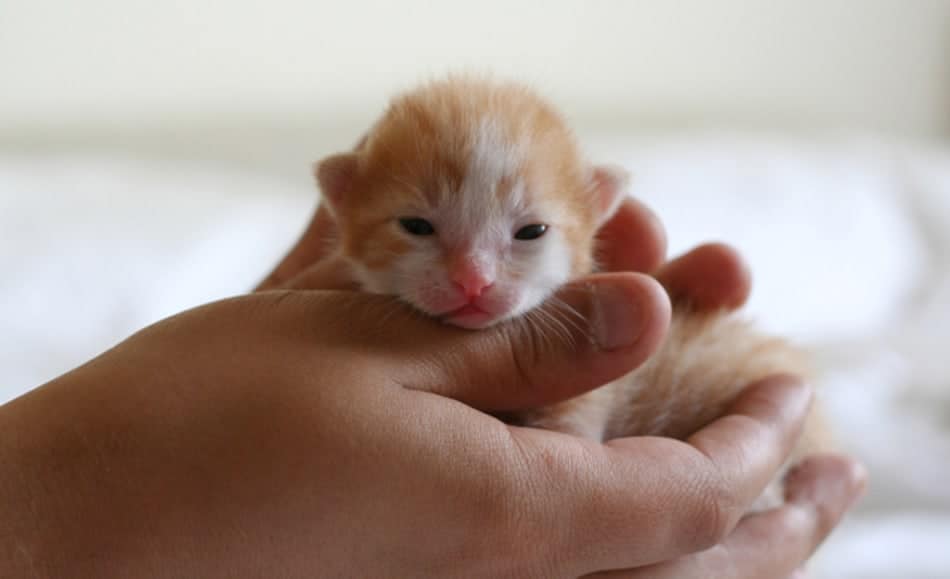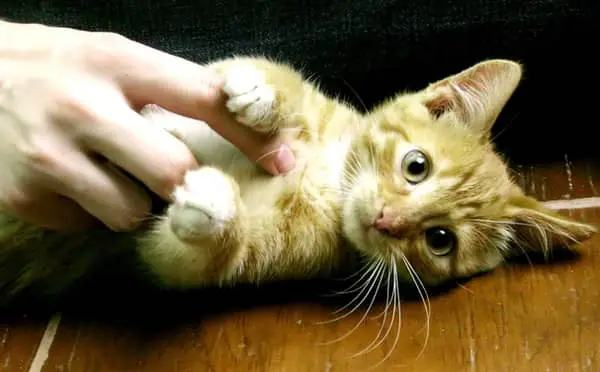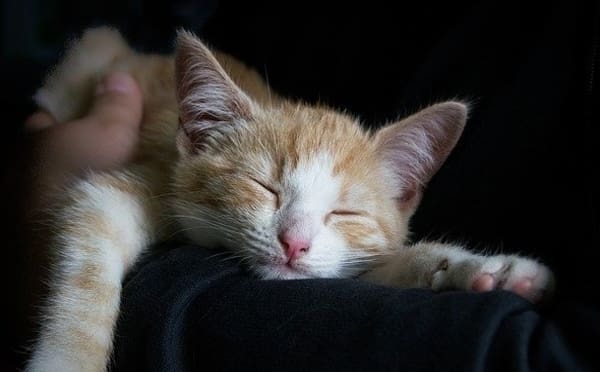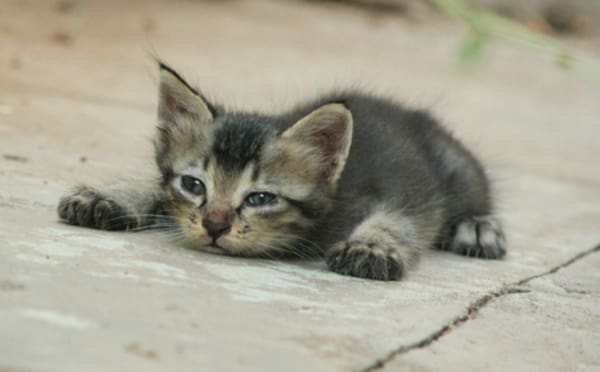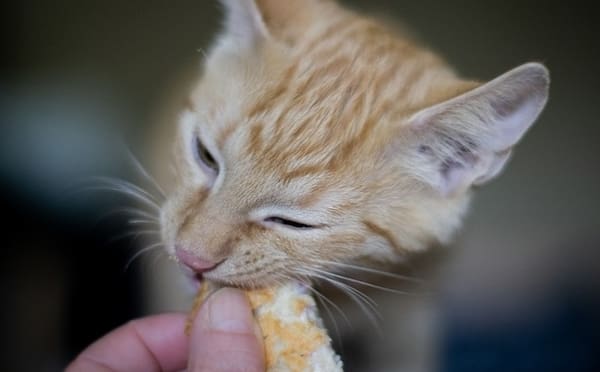Kittens are adorable and joyful additions to any home—they are fluffy, playful, full of personality, and so tiny! Sometimes, however, worries can crop up quite easily when it comes to our new, fragile little companions, especially if we find something like a lumpy belly.
So, why does my kitten’s stomach feel lumpy? There are multiple things that could be happening, such as you kitten being a bit underweight. Additionally, your kitten could have a hernia, intestinal parasites, or a digestive issue such as gas or constipation.
In this article we will discuss how being underweight or having a hernia could result in a lumpy belly for a kitten, as well as how intestinal parasites and digestive troubles could affect your furry friend’s little belly.
Skinny Kitty
Kittens are growing machines—they grow 15 times faster than human babies and have much higher nutritional needs than adult cats. They are full of energy and need plenty of fuel to keep up with their crazy kitten lifestyles. Being carnivores, most of their energy needs to come from animal-based proteins, with fats, minimal carbohydrates, minerals, and nutrients.
Wild and feral kittens find these things with the help of their mothers in the form of hapless birds, rodents, and lizards. In your home, however, these things should come from you in the form of a high quality, kitten-specific food.
It is critical to ensure your kitten gets plenty of nourishment in their first few months as this is when most of their speedy growth occurs. Like babies of almost any species, their tiny tummies cannot hold much in one sitting, so feeding between four and six times a day is ideal.
When you are trying to get your kitten used to dry food, it is even a good idea to leave dry food out throughout the day for a snack.
All of this is to say that it is easier than you might think for your quickly growing kitty to become a little underweight. Because they grow so rapidly and their little metabolisms are chugging along like bullet trains, kittens already tend to not have as much body fat as their adult counterparts.
That said, if your kitten is not eating quite enough (and it can be difficult to track, so do not beat yourself up) they may become underweight. If your kitten is otherwise eating, sleeping, and playing normally, but you are feeling lumps in their belly, they may not have enough body fat in that area, and you could be feeling some internal organs.
This in itself is not an immediate cause for alarm—there is plenty of muscle and other tissue protecting those organs, but your kitten needs more body fat. Consult a feline body condition scoring chart and your veterinarian to make sure you are feeding your tiny pal enough to keep up with its giant growth spurts.
Conversely, if your kitten is a little more on the plump side, what you could be feeling are abdominal fat pads. Abdominal fat pads are exactly what they sound like: small deposits of fat around the abdomen. When you feel them on your cat’s belly, they are soft and somewhat mobile.
However, these deposits are much more common in adult cats, specifically in obese adult cats. The chances of this being the case for your kitten are quite small, but not something to rule out if your kitten is already approaching obesity, which can significantly impact your companion’s quality of life and shorten its lifespan.
If you do not suspect your kitten’s weight to be the problem, it would be wise to check your tiny pal’s tummy for hernias.
Hernia
Like humans and many other mammals, cats and kittens are susceptible to something called hernias. A hernia is a weakening of the muscle wall allowing internal organs and/or tissue to protrude through the wall.
Hernias can be caused by injury, congenital conditions (developed in utero, also referred to as birth defects), chronic bloating, straining to go to the bathroom, or pregnancy. There are various types of hernias that can affect your kitten, but the ones that could cause a lumpy belly are umbilical and hiatal hernias.
Umbilical hernias occur when the umbilical ring does not fully close following birth. It is located under the skin near the belly button, and often looks like a soft swelling or lump that goes away if you press on it (gently of course).
It will come back, however, which is another sign that you likely are dealing with a hernia. Furthermore, they are more noticeable when the cat stands, meows, cries, or otherwise engages its abdomen. Fortunately, umbilical hernias are typically not painful and usually will go away of their own accord at around three to four months of age.
Hiatal hernias are typically congenital, although they can also be caused by an injury. Usually, hiatal hernias will protrude through the diaphragm into the chest cavity, but they can result in herniations of the abdomen as well.
Like umbilical hernias, mild hiatal hernias may require no treatment, but more severe cases might need attention, so it is good to recognize other symptoms of a hiatal hernia, such as these:
- Drooling
- Vomiting
- Coughing
- Decreased appetite or weight loss
- Trouble swallowing
- Rapid or labored breathing
- Lethargy
This list is not all-inclusive and does contain some non-specific symptoms that tend to present in other ailments.
However, if your kitten is displaying these signs coupled with a lumpy belly, it might be safe to assume you are dealing with a hernia. In either case, umbilical or hiatal, it is a good idea to get it checked out by a veterinarian for an accurate diagnosis and treatment if needed.
If you have ruled out weight trouble and hernias but still wonder why your kitten’s tummy is lumpy, intestinal parasites could be to blame.
Unwelcome Guests
Unfortunately, parasites are somewhat common in cats and kittens, are highly transmissible, and while they may not pose a serious risk to adult cats, they can cause significant issues for tiny kittens who are still growing and developing. There are two types of parasites to be aware of in this scenario: intestinal parasites and protozoal parasites.
Intestinal parasites like roundworms and hookworms pose a particular threat to kittens as they can be easily transmitted in larval form from mother to kitten after birth through the mammary glands while the kitten nurses.
Once ingested by the kitten, they will develop into adult worms which can be large, especially in a small kitten’s body, and can lead to potentially fatal complications. However, kittens can easily be dewormed beginning at two to three weeks old, with additional treatments up to 12 weeks.
Protozoal parasites are much smaller (microscopic) and invade the intestinal wall, potentially causing significant irritation of the digestive tract. It is a little more difficult to determine if your kitten has been infected by protozoal parasites than it is with intestinal parasites, but there are ways to narrow it down.
In addition to tummy lumpies, watch out for the following signs and symptoms to determine if your kitten may be harboring these tiny stowaways:
- Vomiting
- Diarrhea
- Coughing
- Blood or mucus in feces (or, in the case of intestinal parasites, eggs in feces)
- Dull coat
- Decreased appetite
- Bloated or pot bellied appearance
It is important to catch parasites in kittens as soon as possible, since they can do quite a bit more damage to tiny bodies than they can to adult cats.
Many times, a parasitic infection can lead to anemia and/or severe dehydration, so if you suspect an infection contact your veterinarian right away. Detection and treatment are usually straightforward so your furry friend likely will be back to themselves in no time.
If nothing we have discussed so far fits your kitten’s situation, one final thing to consider is that your kitten may be experiencing gas and/or constipation.
Gassy Cats
Despite their too-cool reputations, cats and kittens experience gas from time to time just like everyone else. There are multiple things that can cause gas in kittens, but most usually are food related. Kittens are still new here, so when they come off mommy’s milk or switch foods it can make for a perfect storm in their little bellies.
If your kitten is particularly gassy, their belly could bloat, which may result in a little bit of lumpiness. If you think your kitten has been afflicted with this caustic condition, evaluate your feeding habits, and make sure you are feeding high quality, kitten-specific food with no human food or milk (cats are lactose intolerant) to help alleviate the problem.
Conversely, your kitten could be suffering from a case of constipation. Sometimes, constipation can be hard to catch in cats and kittens because you are probably not watching every single litter box event your cat conducts. However, if you notice your kitten has not left you any smelly surprises for two or more days, they may be suffering from constipation.
Common causes are dehydration, an obstruction (in curious kitten cases, this is usually something it ate that is not food, such as ribbons, hair ties, and other non-food items), or parasites.
Constipation can lead to discomfort and complications if not treated in a timely manner, so if you suspect your poor pal is blocked up, schedule a visit with your veterinarian right away so your little pal can get back to playing with you!
Conclusion
If your kitten has a lumpy belly, there could be several things occurring such as low body fat, leading you to be able to feel some of your kitten’s organs. Make sure you are feeding regularly to keep your kitten’s hard-working metabolism satiated. Further, your kitten could have a hernia, caused either by a congenital condition or injury.
Take your pal to the vet to confirm whether treatment is needed, as many hernias resolve themselves. Additionally, your tiny fur ball could be harboring parasites, intestinal or protozoal, and will need to be treated as soon as possible if that is the case.
Finally, your kitten might be experiencing gas or constipation, so again, make sure you are feeding high quality kitten food and be vigilant about your furry friend’s litter box habits. Regardless of the cause, if your kitten’s lumpy belly is concerning you, a trip to the vet is never amiss for the health and wellbeing of your companion.

